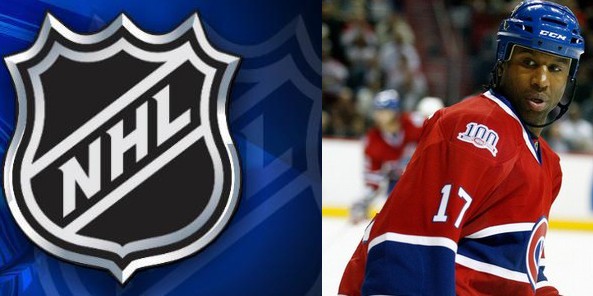If you don’t address the problems that you have, chances are that they won’t go away. And if you believe that statement, then you’ll agree with me that the NHL has a few issues to take care of.
This past weekend there were a few controversial statements that surfaced in the release of former NHL player Georges Laraque’s book, titled The Story of the NHL’s Unlikeliest Tough Guy. Within the book, Laraque claims that there were plenty of players that used steroids to gain an edge on the ice. The alleged users had no boundaries as both stars and goons fell into this category. He goes on to state that there are certain ways to tell which player might be using when it comes to looking at the statistics sheet. But unlike Jose Canseco, Laraque doesn’t reveal a single name throughout the book.
A quick glance at the headlines concerning this issue might cause some to be trying to convince themselves that this morsel of information was put in the book to help sell the book. Others might see Laraque’s red flag statement and declare that the NHL is a cesspool of filth and should experience the same turmoil and troubles that Major League Baseball did. However, for what it is worth, I’m seeing a third opinion that is rising in the ranks of the online sphere of opinions: People don’t care.
And guess what?
I don’t care either.
Let me clear the air on that statement. First and foremost, I believe that steroids shouldn’t be used in any sport, let alone hockey. Those who are desperate enough to inject themselves with performance enhancing drugs deserve all the negative side effects that they will encounter in both the short and long term. Secondly, I’m not naive to think that steroids have never been a part of the NHL, AHL, or ECHL game. Anytime you’re dealing with high stakes scenarios, you will have at least a small portion of the participants indulge in risky behavior. An athlete trying to gain a competitive edge isn’t new. The question that the media and fans would like to know is how many players in the different levels are actually using? Given that PED testing was placed in the 2005 collective bargaining agreement, it might not be all that high. Or it could be running wild in the offseason months. We don’t know.
Excuse me for not pulling a clock out of my pocket like Lewis Carroll’s white rabbit and proceed to claim that the NHL is late on this issue, because I think we’re to the point where that is already understood. The league needs to take a stance on this issue and collectively push their efforts to an extreme. Hopefully the extreme that will take place will be a subsequent ban on any PED use on multiple levels of hockey in North America. Heaven forbid that the league goes in the other direction and require the use of PEDs for all players at the NHL level.
If there is any good news that we should focus on, it is the fact that the current NHL CBA will expire after this season. The league should be able to apply more pressure in negotiating stricter testing procedures moving forward. Failure to do so acknowledges the fact that both the league and the NHL Players Association share no concern for the future reputation of the league. It will also conclude that money reigns over all things on this earth. Although, I think we learned this lesson with the Wall Street fiasco, no?
Since we have time on hands before the current CBA expires, what should we do now? Should we go statistical grave robbing in hopes of allowing the NHL to become morally just again?
I don’t think so. Engaging in a Roger Clemons-like goose chase won’t help anyone – especially for the NHL, who have a hard time as it is making front-page headlines on a national scale. If they start polluting headlines with negative press such as drug use, the game will only fall further down the ladder of success. Rather than investigating the past, the league should recognize the problem at hand and fix it. As for the fans, waving our hands in the air and accusing players at the top of our lungs wouldn’t be very productive. We cannot change the things that have happened in the past. The only thing we can do now is to let it go.
Time will tell whether or not this seed of information on steroid use will grow into a bigger issue. In Georges Laraque’s case, I would image he hopes that his efforts not only change the game for the future, but also sell a few copies of his book in the process. We can all agree that shedding light on this issue can potentially clean up the NHL. Ignoring this problem will only lead to further wormholes down the road. For everyone’s sake, let’s hope someone finally makes things right.

